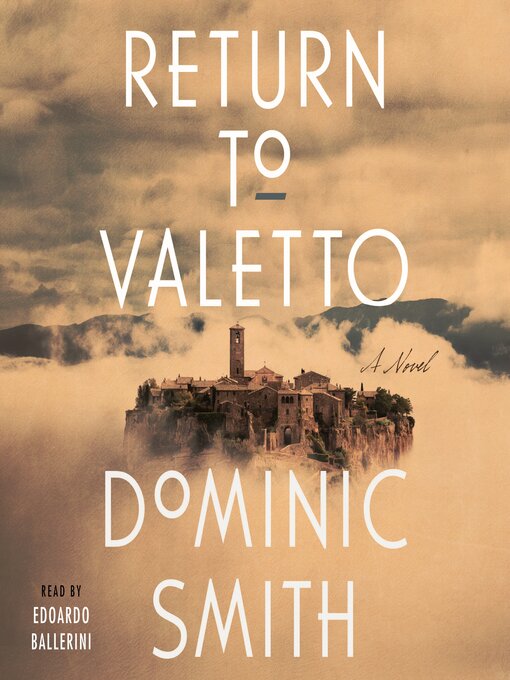"Edoardo Ballerini's adroit narration conveys the subtle changes in
the family, set against the splendor of Valetto's changing landscape."- Bookpage
From the bestselling author of The Last Painting of Sara de Vos, Dominic Smith's Return to Valetto tells of a nearly abandoned Italian village, the family that stayed, and long-buried secrets from World War II.
On a hilltop in Umbria sits Valetto. Once a thriving village—and a hub of resistance and refuge during World War II—centuries of earthquakes, landslides, and the lure of a better life have left it neglected. Only ten residents remain, including the widows Serafino—three eccentric sisters and their steely centenarian mother—who live quietly in their medieval villa. Then their nephew and grandson, Hugh, a historian, returns.
But someone else has arrived before him, laying claim to the cottage where Hugh spent his childhood summers. The unwelcome guest is the captivating and no-nonsense Elisa Tomassi, who asserts that the family patriarch, Aldo Serafino, a resistance fighter whom her own family harbored, gave the cottage to them in gratitude. But like so many threads of history, this revelation unravels a secret—a betrayal, a disappearance, and an unspeakable act of violence—that has impacted Valetto across generations. Who will answer for the crimes of the past?
Dominic Smith's Return to Valetto is a riveting journey into one family's dark history, a page-turning excavation of the ruins of history and our commitment to justice in a fragile world. For fans of Amor Towles, Anthony Doerr, and Jess Walter, it is a deeply human and transporting testament to the possibility of love and understanding across gaps of all kinds—even time.
A Macmillan Audio production from Farrar, Straus and Giroux.
- Available now
- Just added
- No Wait eBooks
- Most popular
- Popular Nonfiction eBooks
- Spanish Titles
- New Kids Additions
- New Teen Additions
- Wisconsin Born and Read
- Great reads without the wait!
- See all ebooks collections
- Available now
- Just added
- Popular Audio Under 1 Hour
- Popular Audio Between 1 and 3 Hours
- Popular Audio Between 3 and 5 Hours
- Popular Audio Between 5 and 10 Hours
- Always Be Listening
- Most popular
- New for Kids
- New for Teens
- New Audiobooks
- Award-Worthy Audiobooks
- L.A. Theatre Works
- See all audiobooks collections
- Food & Cooking
- Home & Garden
- Health & Fitness
- Fashion
- News & Politics
- Hobbies & Crafts
- Celebrity
- Tech & Gaming
- Cars & Motorcycles
- Family & Parenting
- Sports
- Travel & Outdoor
- Photography
- See all magazines collections




